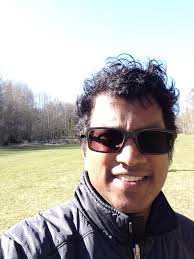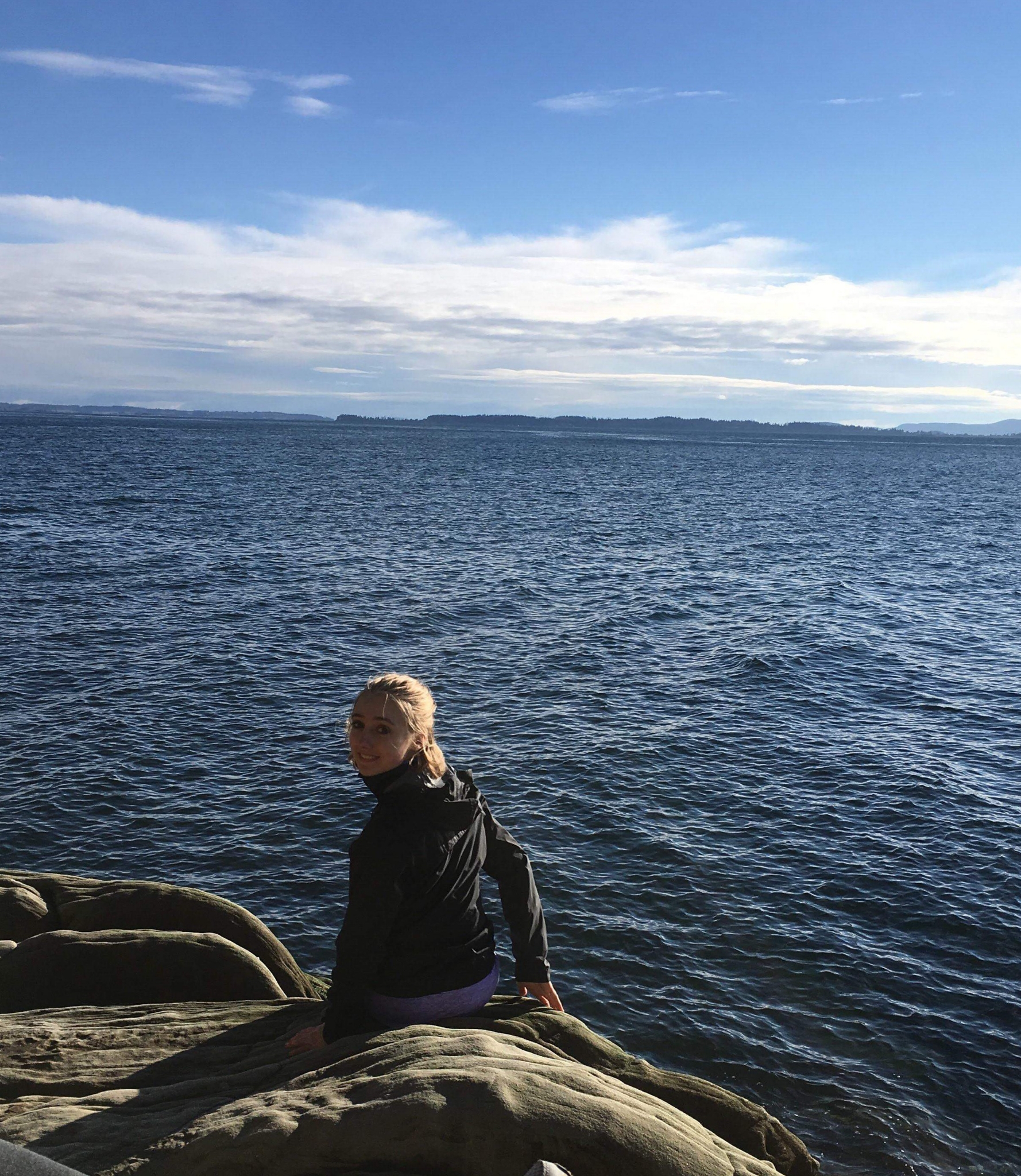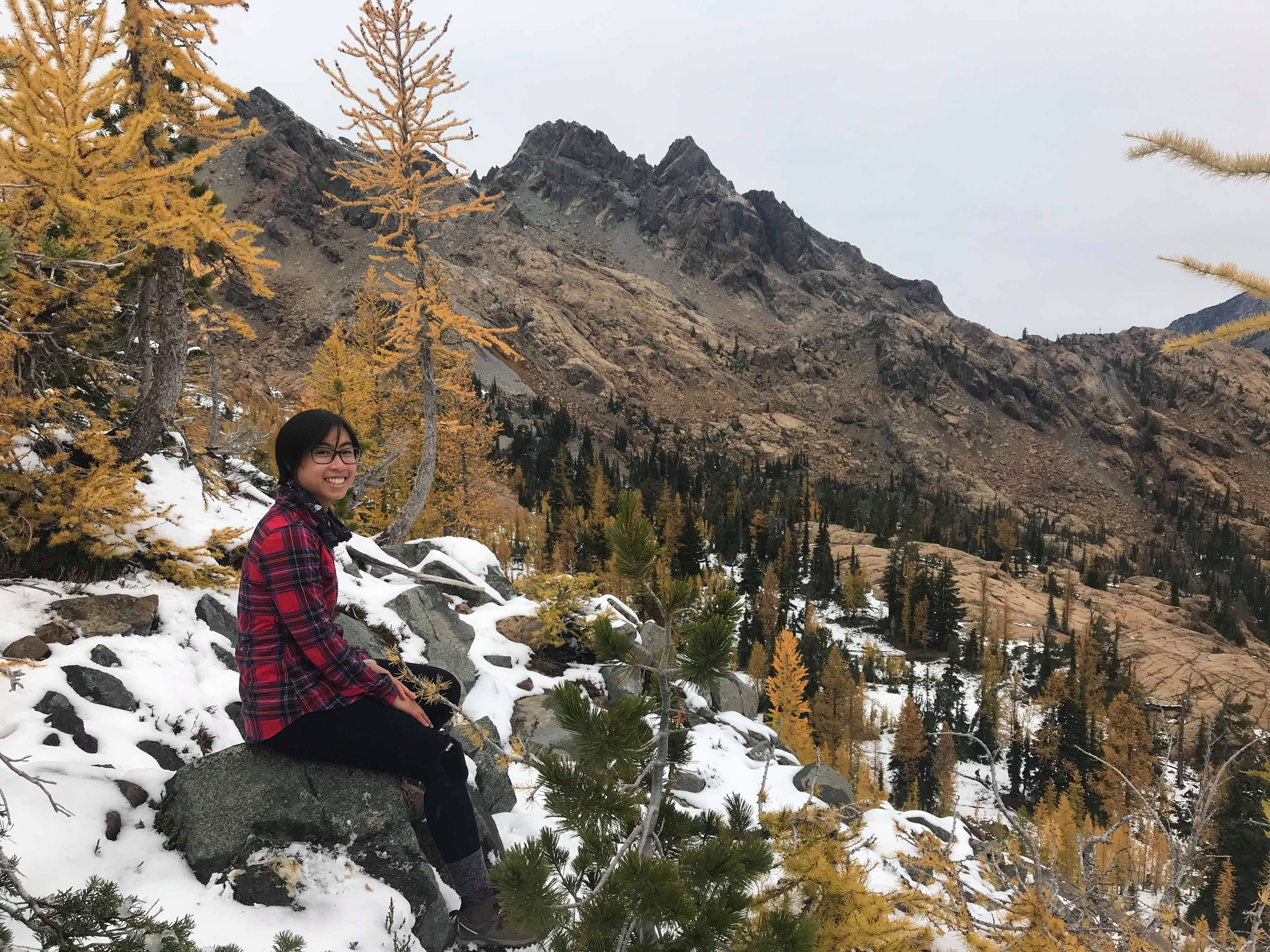
| HOME | PEOPLE | RESEARCH | PUBLICATIONS |
Principal Investigator - Janneke Hille Ris Lambers
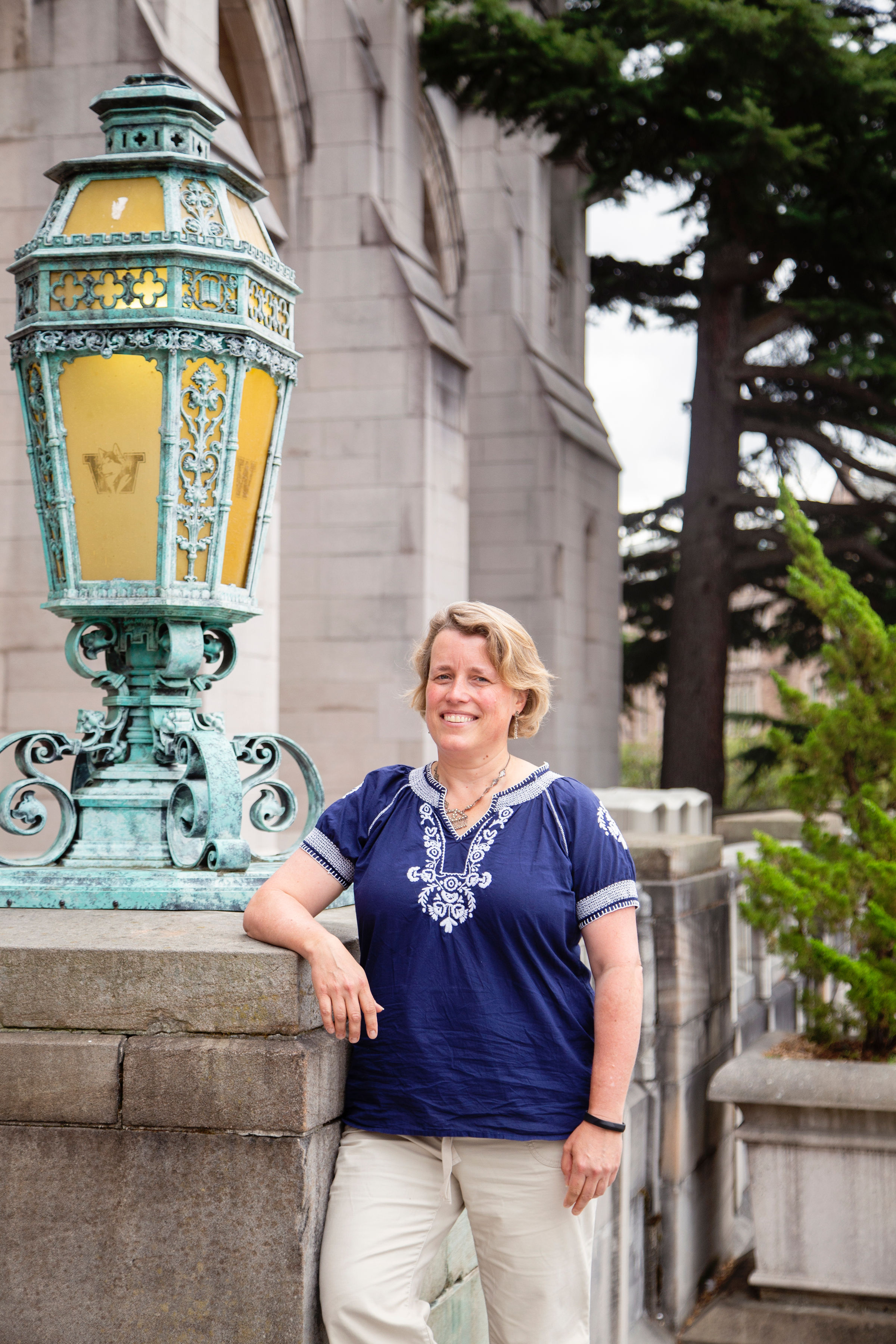
Bio(geo)graphy: I received my Ph.D. from Duke University in 2001 (working with James S. Clark). While at Duke, my field work took me to the Coweeta Hydrologic Laboratory in western North Carolina (an LTER site), where I studied differences among temperate tree species in seed dispersal, seed banking and density-dependent mortality, and how those differences contribute to diversity-maintenance. I then worked with David Tilman at the Cedar Creek Ecosystem Science Reserve (another LTER site associated with University of Minnesota). There, I studied how declining diversity and species identity influences productivity and the impacts of global change on seed production. In a subsequent postdoc at University of California, Santa Barbara (working with Jonathan Levine), I focused on the factors that allowed Mediterranean annual grasses to dominate over the diverse California annual grasses and forbs as well as the contributions of niche and neutral processes to the coexistence of Serpentine annuals. I arrived at University of Washington in 2006. I started a new position at the Eidgenössische Technische Hochschule in Zürich, Switzerland (ETHZ) in fall of 2020. I remain an Affiliate Full Professor at University of Washington.
Professional Interests: I am a plant community ecologist broadly interested in: 1) the impacts of global environtmental change on plant communities and 2) the maintenance of species diversity. I approach questions of interest with observational studies, manipulative experiments, and statistical modeling, and have worked in a variety of habitats (temperate forests, tall grass prairies, annual grasslands). In the last decade, my field research has primarily occurred in the temperate coniferous rainforests and montane meadows of Washington State (USA). Check out the Research page on this website for more information on ongoing projects, and the Publications page for information on all past studies. I have recently started a new position at ETH Zürich in Switzerland, so eventually, the plant ecology group website at ETHZ (currently under construction) will provide the most up-to-date information on my groups current activities.
Postdoc - Rubén D. Manzanedo (currently at ETH Zürich)
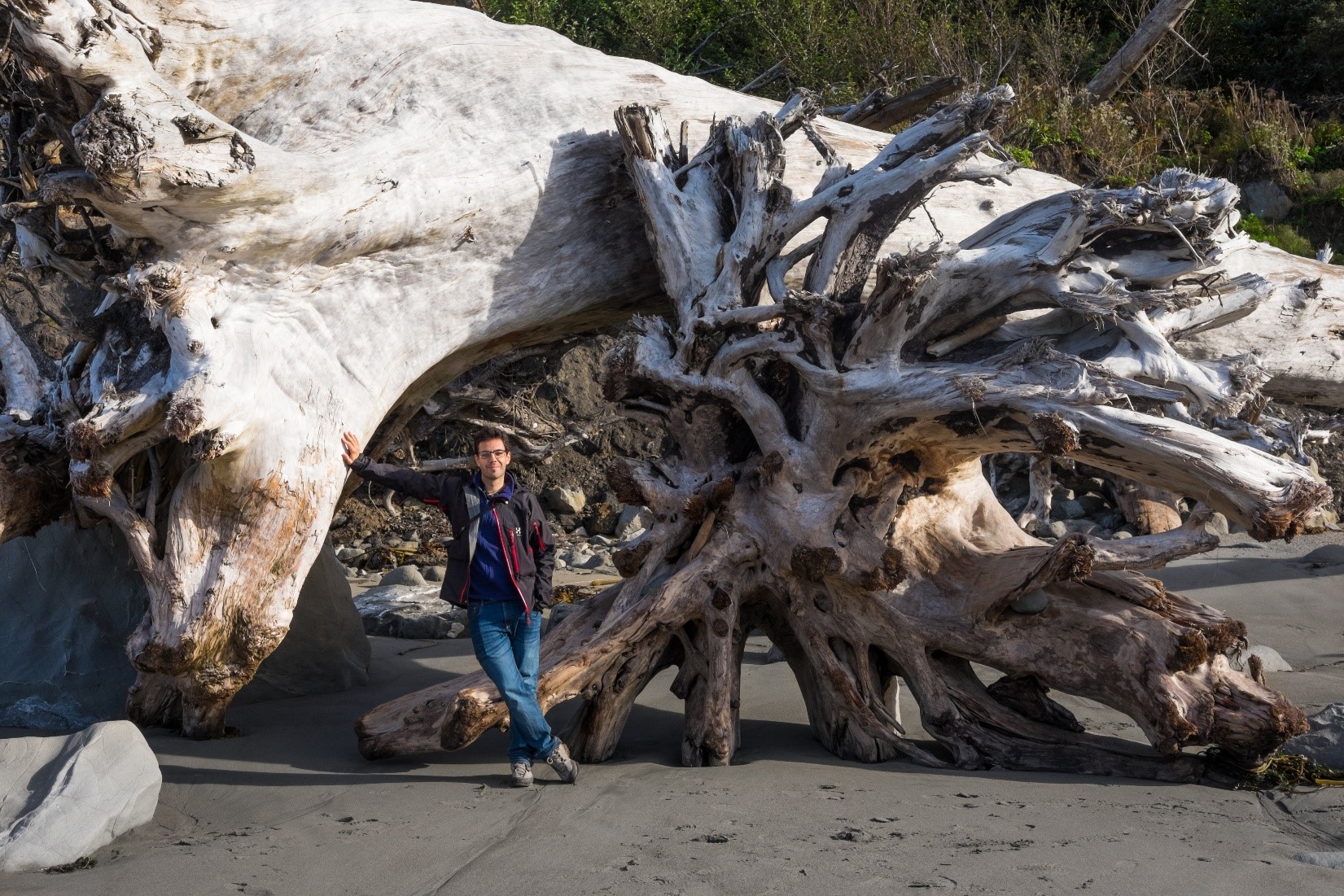 I am a Swiss
National Science Foundation Postdoctoral Fellow. I was born in Spain, where I studied
agricultural and forestry engineering, moved to Switzerland to do my PhD in
ecology, and fell in love with the Swiss Alps and the alpine environment. I
received my PhD from the University of Bern in 2017, studying local adaptation
of dominant tree species in Europe. Since then, I have led two postdoctoral
fellowships supported by SNSF, in Harvard University and the University of
Washington, using global tree ring databases to study long-term macroecological
patterns and climate change. I joined the HRL lab in 2019.
I am a Swiss
National Science Foundation Postdoctoral Fellow. I was born in Spain, where I studied
agricultural and forestry engineering, moved to Switzerland to do my PhD in
ecology, and fell in love with the Swiss Alps and the alpine environment. I
received my PhD from the University of Bern in 2017, studying local adaptation
of dominant tree species in Europe. Since then, I have led two postdoctoral
fellowships supported by SNSF, in Harvard University and the University of
Washington, using global tree ring databases to study long-term macroecological
patterns and climate change. I joined the HRL lab in 2019.
I have broad ecological interests,
but questions that fascinate me the most are: the working of long-term dynamics in
ecological communities, the changes in the structure and interactions (biotic
and abiotic) of plant populations, and how climate change is influencing them. I
think that long-term dynamics are still barely explored in ecology, and I find
fascinating the methodological challenge of exploring temporal scales way
beyond our own ones. This also requires using multidisciplinary approaches and
collaborating with a diverse set of scientists from many nationalities and
backgrounds, which I thoroughly enjoy. Particularly, merging paleoecological records
(such as tree rings or lake sediments) and neoecological records (such as field
experiments or remote sensing data) is, in my opinion, a fantastic avenue of
research that will advance how we understand ecological interactions and
contextualize current and future environmental changes.
Graduate Student - Stuart Graham
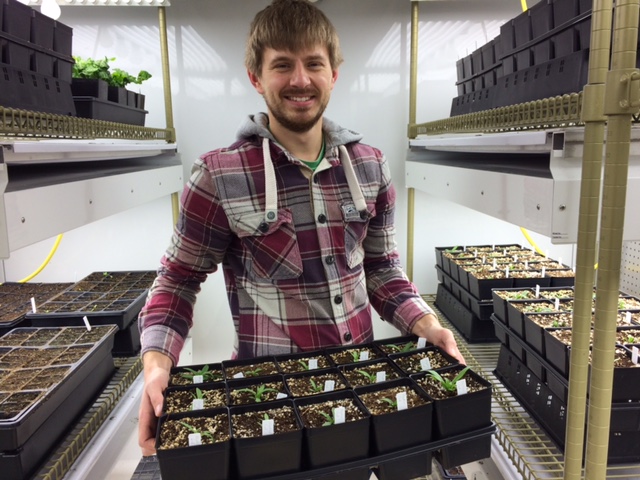 The
structure and behavior of ecological systems are determined by the
innumerable interactions among their components. This includes not only
the interactions between organisms, but also the interactions between
organisms and the non-living features of their environment such as
climate. Predicting the response of ecological systems to external
perturbations like climate change requires models that accurately
quantify these interactions. Yet, the incredible diversity of
ecological systems and the interactions they contain makes the
development of such models a formidable task. My research aims to
address this challenge by applying data science methods to ecological
data. My main project uses machine learning approaches to quantify the
competitive interactions among co-occurring tree species at Mount
Rainier National Park. In another project I am using a combination of
greenhouse experiments and high-throughput genetic sequencing to
understand how the distribution of soil fungi may influence the
response of high elevation tree species to climate change.
The
structure and behavior of ecological systems are determined by the
innumerable interactions among their components. This includes not only
the interactions between organisms, but also the interactions between
organisms and the non-living features of their environment such as
climate. Predicting the response of ecological systems to external
perturbations like climate change requires models that accurately
quantify these interactions. Yet, the incredible diversity of
ecological systems and the interactions they contain makes the
development of such models a formidable task. My research aims to
address this challenge by applying data science methods to ecological
data. My main project uses machine learning approaches to quantify the
competitive interactions among co-occurring tree species at Mount
Rainier National Park. In another project I am using a combination of
greenhouse experiments and high-throughput genetic sequencing to
understand how the distribution of soil fungi may influence the
response of high elevation tree species to climate change.
As a native of
rural Northern England, I completed my undergraduate degree at the
University of Bristol in the UK. I received master’s degrees from
Uppsala University (Sweden) and University of Montpellier II (France)
through my participation in the Erasmus Mundus Master Programme in
Evolutionary Biology (MEME). After completing the final semester of my
master’s program at Harvard University, I moved to the west coast where
I worked as a research assistant at UC Santa Barbara. I joined the lab
as a graduate student in 2017.
Graduate Student - Aji John
Aji is a PhD candidate in Biology at University of Washington, where he is co-advised by Janneke Hille Ris Lambers and Ka Yee Yeung (from University of Washington, Tacoma). Aji joined the Biology Department in 2017 Aji explores microclimatic patterns in forest understories and studies phenology of wildflower meadows using high-resolution satellite imagery. His research is aided by a desire to develop open source instrumentation for environmental sensing and plant physiology. He also actively works in developing workflow solutions to analyze large datasets in Cloud.
Graduate Student - Kavya Pradhan
Why are organisms where they are and, in the face of global changes (like changes in climatic conditions and land-use patterns), where will they go? In other words, what are the current patterns of biodiversity, how will global changes affect them, and how can we better predict and project these changes? These are the central questions that have motivated me to pursue ecological research and join the HilleRisLambers lab as a graduate student in 2017.
I’m excited to explore the ecosystems of the Pacific Northwest and find interesting questions to delve into. Born and raised in Nepal where the hills, mountains, and rain were my constant companion, I arrived stateside in 2010 and started working on my undergraduate degree at Randolph (Macon Woman’s) College in VA. I then pursued my Master's in Ecology in the Fitzpatrick Lab at the Appalachian Lab (University of Maryland Center of Environmental Sciences, MD).
Graduate Student - Meera SethiI was born and raised in Singapore, and made my way to Seattle by way of Boston, Chicago, and Berkeley. In that time I earned a B.A. in Comparative Literature and an M.A. in Children’s Literature and Teaching, and worked as a middle school humanities teacher and a textbook editor before finally giving in to my late-blooming love of science. Before joining the HRL lab in 2015, I was a freelance science writer and a serial field technician on ecological research projects in Sweden, Alaska, and California.
If no man is an island, neither is any plant, insect, bird, bacterium, or other form of life on earth. From birth to death, all organisms are caught up in a complex network of interactions—both positive and negative—with other living things. For some, these relationships are important enough to play a role in determining vital outcomes like survival, reproductive success, and distribution range limits. What will happen to individual species and to communities if a warming planet induces significant shifts in biotic interactions? I joined the Hille Ris Lambers lab with a broad interest in this question, and today my research focuses on the impacts of climate change on the relationships between subalpine meadow plants and their insect herbivores. I am also curious about the indirect effects herbivory may have on insect pollinators, and use a combination of observational methods in the field and experimental approaches in the lab to quantify these phenomena.
My website is here and my blog is here. I also tweet about science, grad school, and life in general as @gruntleme.
Visiting Graduate Student - Jiajia Su
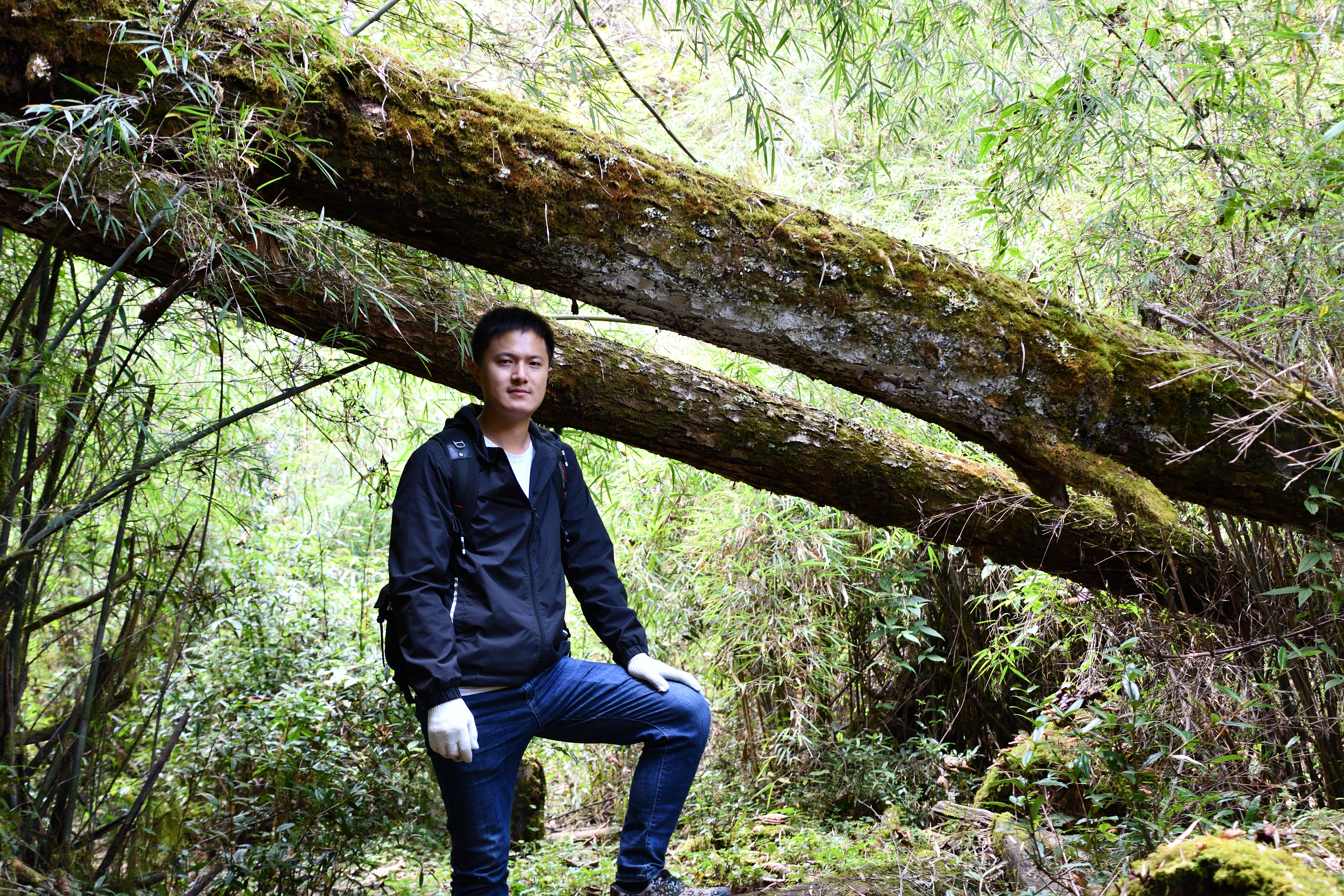 Forests
are an important of the global carbon cycle and global biodiversity. If
climate continues to change as anticipated, increasing drought may
affect the composition and structure of many forests. Understanding
what determines drought sensitivity of forests is therefore a critical
step towards accurately predicting forest ecosystem responses to
climate change and supporting future mitigation and protection
strategies. On the other hand, lack of long-term climate observations
severely limits our understanding of the global processes (e.g.,
drought, floods) driving forests change in many regions. I address
these questions in subtropical southwest China, one of the largest
exposed carbonate rock areas in the world, with extensive
climate-sensitive and climate-change vulnerable karst ecosystems.
Forests
are an important of the global carbon cycle and global biodiversity. If
climate continues to change as anticipated, increasing drought may
affect the composition and structure of many forests. Understanding
what determines drought sensitivity of forests is therefore a critical
step towards accurately predicting forest ecosystem responses to
climate change and supporting future mitigation and protection
strategies. On the other hand, lack of long-term climate observations
severely limits our understanding of the global processes (e.g.,
drought, floods) driving forests change in many regions. I address
these questions in subtropical southwest China, one of the largest
exposed carbonate rock areas in the world, with extensive
climate-sensitive and climate-change vulnerable karst ecosystems.
I was born and raised in south China, where the Yangtze river, farmland, and rain were my constant companions during my undergraduate study. Then, after being inspired by a long bicycle trip through the Remote Tibet Plateau, I arrived in northwest China in 2014 and started working on my Master Program in physical geography in Lanzhou University and fell in love with it. After 2016, I continue my research in Lanzhou University and start pursuing my doctorate on Dendrochronology. I came to UW in 2019 as a visiting student and fortunate enough to explore my research questions in the Hille Ris Lambers lab.
Undergraduate Researcher - Lauren Dorsch
My curiosity of how ecosystems function has been a large part of my education leading up to my time at UW. I have done field studies on eutrophication in my hometown and a local forestry project about the process of succession on Blanchard Mountain. Every research paper I wrote I looked at a specific ecosystem and the impacts we have on that ecosystem. Yet, much of my work has been limited to the facilities that I have been a part of. UW has expanded my opportunities to look at ecosystem services and understand how we manipulate them. I am majoring in Environmental Science and Resource Management, with a growing interest in fungal ecology. I joined the Hille Ris Lambers lab in fall of 2018, and I am excited for the chance to learn how climate change is affecting the species composition -both above ground and in soils- of the Pacific Northwest.
Undergraduate Researcher - Ammara Touch
As someone who is interested in understanding the web of complex interactions between all organisms--as well as the interactions between the environment and humans--and calls the mountains home, I found the HilleRisLambers lab to be a great place to continue nurturing my passion for that area of study. My love for mountains, having grown up in the PNW my whole life, taught me much about how dynamic the landscapes can be along an altitudinal gradient and in this place I could constantly question about how and why things worked in nature the way they did. The research of this lab aligns with many of the questions I had contemplated growing up as I learned about the far-reaching anthropogenic impacts on the planet: how does a warming climate change the relationships between organisms and ultimately its functionality? How does lifetime phenology and availability of resources alter with climate change, and what does that mean for the ecological community structure as a whole? It's like thinking about the ways pieces of a puzzle fit together. With my recently developed affinity for plants and plant ID, I'm excited to see what new discoveries and revelations my time working here will bring.
I'm currently a third-year student intending to major in biology (ecology, evolution, conservation) and American Ethnic Studies, and minor in diversity. Career-wise, I'm still thinking about what I want to do, but I know I would like to somehow
combine education, ecological research and social justice into my endeavors. I hope later in my studies to potentially apply future research I participate in to see how the effects of climate change may influence frontline communities--namely indigenous communities and other racially marginalized groups.
Alumni (grads and postdocs)
Leander Anderegg (grad: 2012-2017). Leander worked on a variety of projects while in the HilleRisLambers lab, including the physiological processes influencing range limits, the influence of macroclimate and competition on tree sensitivity to climate, the sources and consequences of trait based variation on the Leaf Economics Spectrum. Leander is currently an NSF funded postdoctoral research fellow at UC Berkeley.
Ian Breckheimer (grad: 2012-2017). While in the HilleRisLambers lab, Ian worked on a diversity of projects related to wildflower phenology and climate change, spatial patterns in microclimate variability, and eco-evolutionary constraints on populatoin growth at range limits. Ian is currently an NSF funded postdoctoral research fellow at Harvard University.
Cynthia Chang (postdoc: 2012-2014). While in the HilleRisLambers lab, Cynthia applied trait-based and phylogenetic based approaches to a plant community assembly data set from Mt. St. Helens. Cynthia is currently an assistant professor at
University of Washington, the Bothell campus (Bothell, WA).
Ailene Ettinger (grad: 2007-2013). While in the HilleRisLambers lab, Ailene studied the relative importance of climatic constraints and competitive interactions for the performance of six conifer trees at their altitudinal range limits within Mt. Rainier National Park, using dendroecological techniques and a manipulative transplant experiment to answer her questions. Ailene is currently a quantitative ecologist at The Nature Conservancy (Seattle).
Elli Theobald (grad: 2010-2016). Elli focused on the relative importance of plant-pollinator interactions for range limits and the role of climate in driving wildlflower phenology while in the lab. Additionally, Elli spent time thinking about how to best teach climate change impacts to undergraduates, and was instrumental in helping establish MeadoWatch, our lab citizen science program. Elli is currently a Principle Lecturer in the Biology Department at University of Washington.
Kevin Ford (grad: 2008-2014). While in the HilleRisLambers lab, Kevin worked on a number of projects, including the relevant scale of microclimate variability for subalpine vegetation distributions; the relationship between tree growth across range limits, and the relative importance of climate and edaphic conditions for range expansions of treeline and subalpine plants. Kevin is currently a biometrician with the BLM (in Portland, OR).
Melanie Harsch (postdoc: 2012-2015). While in the HilleRisLambers lab, Melanie worked on range shifts of western plant species, using large databases. Melanie is currently a data analyst for NOAA.
Steve Kroiss (postdoc: 2012-2015). While in the HilleRisLambers lab, Steve worked on recruitment limitation of conifers as well as creating IPM models for Pacific silver fir. Steve is currently a data analyst for Intellectual Ventures.
Haldre Rogers (grad: 2006-2011). Haldre Rogers was co-located in the Tewksbury and HilleRisLambers labs while at the University of Washington. Haldre studied the impacts of complete bird loss on Guam on the dispersal of tree seeds (with the majority of species in Guams forests dispersed by birds) and the insect herbivory of tree seedlings (potentially controlled by bird predation). Haldre continues to work in this amazing system (see her project website), and is currently an Assistant Professor at Iowa State University.Susan Waters (grad: 2007-2013). While in the HilleRisLambers lab, Susan studied the role of indirect, pollinator-mediated interactions between native and exotic plants in a rare and heavily invaded habitat - south Puget Sound Prairies. Susan is also the co-founder of the awesome Urban Pollination Project (a citizen science project documenting urban pollination services in Seattle). Susan is currently a rare species ecologist working with the Center of Land Management (CNLM) in Olympia, Washington.
Sylvia Yang (grad: 2006-2011). Sylvia was co-located in the Ruesink and HilleRisLambers labs while at the University of Washington. Sylvia worked on the ecosystem engineering abilities of eelgrass (Zostera marina), using observations, experimental manipulations, and modeling. Sylvia is currently a Marine Scientist at the Shannon Point Marine Center (Anacortes, WA), which is affiliated with Western Washington University (Bellingham, WA).
Undergraduate and Postgrad Alumni
Chelsea Brogan (Undergraduate researcher 2020)
Ari Geary-Teeter (Undergraduate researcher 2020)
Haleh Mawson (Undergraduate researcher 2020)
Makaila Wood (Field Ecology Intern 2019, 2020)
Sophia Basil (Field Ecology Intern 2019)
Ashley Cole (Field Ecology Intern 2019)
Ramy Ghaly (Field Ecology Intern 2019)
Peter Walsh (Field Ecology Intern 2019)
Cole Lysgaard (Undergraduate researcher 2017-2019, Field Ecology Intern 2018, Field crew leader 2019)
Kyra Kaiser (Field Ecology Intern, Undergraduate researcher 2017-2019)
Juana Rivera-Ordonez (Field Ecology Intern 2018)
Kianna Dieudonne (Postgrad researcher, 2018)
Katie Nielsen (Undergraduate researcher, Field Ecology Internship, 2017-2018): grad at Washington State University
Ben Simpson (Undergraduate researcher, 2018)
Josh Fowler (Field Ecology Intern 2017, Field Crew leader 2018): grad at Rice University
Alec Baird (Undergraduate researcher, field intern, postgraduate researcher - 2014-2017): grad at UCLA
Jose Esparza (Doris Duke Conservation Scholar Intern 2017)
Kyle Gibbs (Field Ecology Intern 2017)
Max Haenel (Field Ecology Intern 2017)
Jessie Hild (Undergraduate researcher, field intern - 2016-2017)
Bailey Hussung (Doris Duke Conservation Scholar Intern 2017)
Myesa Legendre-Fixx (Undergraduate researcher, field intern - 2015-2017)
Emmi Lia (field intern, crew leader, lab manager - 2015 - 2017)
Tristan O'Mara (Undergraduate researcher, field intern - 2015-2017)
Elise Pletcher (Undergraduate researcher, field intern - 2015-2017): grad at UBC
Teodora Rautu (Undergraduate researcher, field intern - 2015-2017)
Leila Ayad (Doris Duke Conservation Scholar Intern 2016)
Aden Kinne (Field Ecology Intern 2016)
James Martin (Doris Duke Conservation Scholar Intern 2016)
Soline Martine-Blangy (Visiting Student 2016)
Tatsu Ota (Field Ecology Intern 2016)
Alex Wall (Field Ecology Intern 2016)
Rachel Brunner (2015 Cascade Legacy Field Crew Leader): current grad at Oregon State University
Kaitlyn Engel (Mt. Rainier Research Intern 2015)
Colin Fagan (Mt. Rainier Research Intern 2015)
David Grow (Mt. Rainier Research Intern 2015)
Adrienne Hampton (Mt. Rainier Research Intern 2015): MPA from University of Washington
Laurel Sebastian (REU 2015)
Anna Wilson (Mt. Rainier Research Intern, Lab Manager, MeadoWatch volunteer coordinator 2012-2015)
Hannah Besso (Mt. Rainier Research Intern 2014)
Emily Chan (Mt. Rainier Research Intern 2014)
Drew Lyons (Mt. Rainier Research Intern 2014)
Lane Felker (Mt. Rainier Research Intern 2013, undergraduate researcher 2013-2014)
James Lucas (2014 Mt. Rainier REU)
Gregor Siegmund (2014 Field Crew Leader, Mt. Rainier Research Intern 2013): current grad at Cornell University
Hannah Wiesner (2015 Field Crew Leader, Mt. Rainier Research Intern 2014)
Cherry Chen (Mt. Rainier Research Intern 2013, undergraduate researcher 2011-2013)
June Landenburger (Mt. Rainier Research Intern, undergraduate researcher 2013-2014)
Jacqui Levy (Mt. Rainier Research Intern 2013)
Katy Olsen (Mt. Rainier Research Intern 2013)
Sam Reed (Mt. Rainier Research Intern 2013, postgrad researcher 2013-2014)
Caitlin Budd (Mt. Rainier Research Intern 2012)
Kathleen Burns (summer REU: 2012)
Liam Fitzgerald (Mt. Rainier Research Intern 2012)
Natasha Lozanoff (Mt. Rainier Research Intern 2012)
Anna O'Brien (undergraduate researcher, lab manager: 2007-2011): currently a graduate student at UC Davis
Sara Eshe (undergraduate researcher: 2010-2011)
Melissa Winstanley (undergraduate researcher: 2009 - 2010)
Irene Weber (undergraduate researcher: 2009 - 2010): currently a graduate student at Southern Illinois University
Ben Lee (Mt. Rainier Research Intern 2011, undergraduate researcher 2011-2012): current grad at U. of Michigan
Sarah Montgomery (Mt. Rainier Research Intern 2011, undergraduate researcher 2011-2012)
Courtenay Ray (Mt. Rainier Research Intern 2011): currently a graduate student at Arizona State University
Jennifer Rickwalt (Mt. Rainier Research Intern 2011)
Mitch Piper (Mt. Rainier Research Intern 2010, Crew Leader 2011-2012)
Courtney Wenneborg (Mt. Rainier Research Intern 2010)
Jonathan Deschamps (undergraduate researcher, Mt. Rainier Research Intern 2007 - 2009)
Gerald Lisi (Mt. Rainier Research Intern 2008, 2009)
Alan Wright (Mt. Rainier Research Intern 2009)
Rachel Konrady (Mt. Rainier Research Intern 2009)
Tony Krueger (Mt. Rainier Research Intern 2009)
Amado Fuentes (Mt. Rainier Research Intern 2008)
Biology Department
University of Washington
Seattle WA, 98195-1800
Also:
(as of September 2020)
Plant Ecology Group (website under construction)
ETH Zürich, Switzerland
